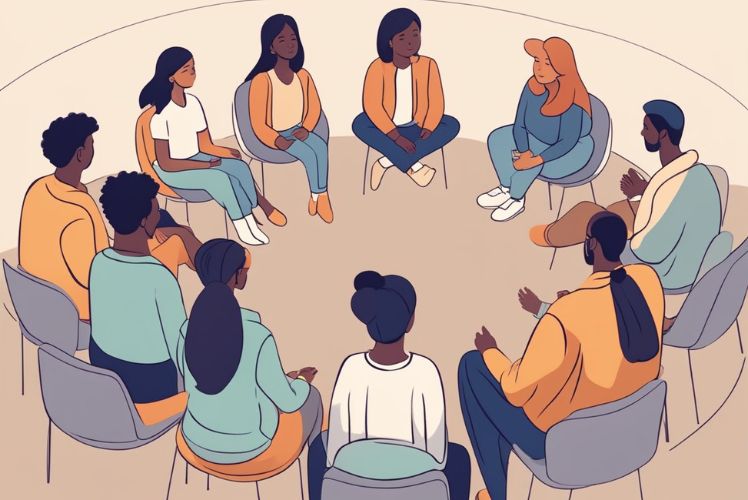Group therapy offers a unique and powerful way to address mental health challenges by bringing people together in a supportive environment. In these sessions, individuals not only share their experiences but also learn valuable coping strategies from one another. Participating in group therapy can help build emotional resilience and foster a sense of belonging among members.
By engaging with others facing similar issues, we find that the healing process becomes more accessible. Group therapy allows us to connect with others, reducing feelings of isolation while providing multiple perspectives on our struggles. The structure of these sessions encourages open dialogue and the development of interpersonal skills that are vital for personal growth.
Choosing group therapy over individual sessions can significantly enhance our understanding of ourselves and others. Those who join often discover new ways to confront their challenges, benefiting from the collective wisdom and support available in the group setting.
Key Takeaways
- Group therapy fosters connection and supports emotional resilience.
- Sharing experiences with others helps us gain new perspectives.
- The collaborative setting enhances personal growth and coping strategies.
Understanding Group Therapy
Group therapy plays a vital role in addressing various mental health conditions. We will explore its historical background and the therapeutic approaches involved. This understanding helps us appreciate the significance of group dynamics in the healing process.
Historical Background
Group therapy began in the early 20th century. It gained traction during World War II as a response to the mental health needs of returning soldiers. Therapists recognised that shared experiences could aid recovery.
In the 1950s, pioneers like Dr. Joseph H. Pratt developed structured group sessions. He aimed to create a space where individuals could feel supported and understood. Over time, research showed that group therapy effectively treats conditions like depression, anxiety, and trauma.
Today, we see various types of group therapy, such as support groups and process groups. Each serves distinct purposes while fostering connection and healing among participants.
Therapeutic Approach and Psychotherapy
In group therapy, we engage with one or more professionals who lead discussions. This therapeutic approach allows individuals to share experiences and feelings in a supportive environment.
Group psychotherapy focuses on personal interactions. It helps us learn from others and develop coping mechanisms. Participants often realise they are not alone in their struggles, which can be comforting and empowering.
Sessions typically emphasise active listening, empathy, and feedback. Confidentiality is crucial, as it encourages open sharing. As we build trust within the group, we can explore deeper emotional issues that contribute to our mental health conditions. This process not only enhances self-awareness but also fosters strong interpersonal bonds.
The Benefits of Sharing in a Group Setting
In a group therapy setting, sharing experiences can lead to significant personal growth. Engaging with others not only enhances our social skills but also fosters a sense of community and belonging. We create a supportive environment where emotional connections can thrive.
Enhancing Social Skills
When we participate in group therapy, we practise essential social skills. Sharing our thoughts and feelings encourages active listening, empathy, and respectful communication.
In this safe space, we can interact with diverse individuals. This helps us learn different perspectives and develop our ability to express ourselves more clearly.
By working through challenges together, we can identify common issues and practice constructive feedback. These experiences can boost our confidence, making it easier to engage with others outside the group.
Cultivating a Supportive Environment
Group therapy provides a unique opportunity for us to cultivate a supportive environment. Here, we feel safe to share our vulnerabilities without fear of judgement.
As we hear others' stories, we recognise shared experiences that foster stronger bonds. This sense of community can help reduce feelings of isolation.
Encouragement from fellow members reinforces our progress as we celebrate achievements together. Being part of this collective journey empowers us and reminds us that we are not alone in facing our difficulties.
Comparative Analysis: Group Therapy Versus Individual Therapy
When considering therapy options, we see valuable differences between group therapy and individual therapy. Each has unique benefits that cater to varying needs and preferences.
Diverse Perspectives and Community Building
In group therapy, participants experience the strength of community. Sharing similar struggles leads to a sense of belonging. This connection can reduce feelings of isolation, enhancing motivation and recovery.
Moreover, group therapy brings together diverse perspectives. Participants share experiences and coping strategies. This exchange can introduce different viewpoints, helping us to see our situations in new lights.
Hearing others' stories often fosters empathy. We learn from each other, gaining insights that individual therapy might not provide. This collective healing creates a support network, making group therapy a powerful option for many.
Cost-Effectiveness and Resource Allocation
Group therapy tends to be more cost-effective than individual therapy. Healthcare systems can allocate resources more efficiently when treating multiple people at once. This efficiency can expand access to mental health support for those in need.
In some cases, group sessions can reduce wait times for therapy. More people can benefit from mental health services as a result. This is particularly important in settings with limited resources.
By sharing costs among participants, we can lower individual fees. This makes therapy accessible for a larger number of individuals, offering valuable support at a fraction of the price of individual sessions.
Mechanisms of Healing in Group Therapy
In group therapy, specific mechanisms contribute to healing and personal growth. Key factors include group dynamics, cohesion, and the impact of feedback and reflection. These elements create a supportive environment that fosters understanding and connection among participants.
Group Dynamics and Cohesion
Group dynamics play a crucial role in the therapeutic process. We build connections through shared experiences, which creates a sense of belonging. This cohesion encourages members to open up and share their struggles.
As we engage, we learn from each other’s perspectives. This exchange helps us recognise that we are not alone in our feelings or challenges. The support network within the group can motivate us to confront our issues more effectively.
Trust is paramount; as we grow closer, we feel safer to explore deeper emotions. This process enhances our ability to heal and fosters personal growth. The communal aspect of group therapy often leads to powerful transformations.
The Role of Feedback and Reflection
Feedback in group sessions holds significant value for our healing journey. When we express thoughts and feelings, we develop insights about ourselves. Others can provide perspectives that we may not see on our own.
Constructive feedback allows us to reflect on our behaviours and thought patterns. This reflection can uncover blind spots and facilitate understanding of our personal experiences. The group environment encourages us to examine our actions and consider alternative approaches.
Through this process, we can identify unhealthy patterns and replace them with healthier ones. The continuous cycle of sharing and reflecting enhances our emotional awareness. This strengthens our capacity for change and growth in our everyday lives.
Addressing Mental Health Challenges
In our journey through mental health, group therapy offers valuable support for individuals facing challenges like anxiety, depression, trauma, and addiction recovery. By sharing experiences, we build a community that fosters healing and resilience.
Anxiety and Depression
Anxiety and depression are common issues that many individuals face. In group therapy, we find a space where sharing our struggles helps reduce the feelings of isolation.
Through discussions, we learn coping strategies such as mindfulness, deep breathing exercises, and cognitive behavioural techniques. Each session allows us to gain new insights and perspectives on our feelings.
Hearing others’ experiences can inspire hope and motivate us to take steps towards recovery. We often feel validated knowing we are not alone in our journey.
Trauma and Addiction Recovery
Trauma can have lasting impacts on mental health, often leading to addiction as a way to cope. Group therapy provides a safe environment for us to confront these painful experiences together.
We can openly discuss our triggers and coping mechanisms, which fosters a sense of belonging. By sharing knowledge, we can explore healthier coping strategies, such as engaging in creative outlets or physical activities.
Our collective healing journey encourages us to confront addiction while recognising that recovery is a process. We learn from one another’s stories, which can empower us to make meaningful changes in our lives.
The Structure of Therapy Groups
In therapy groups, structure plays a vital role in fostering a safe and supportive environment. Different types of therapy groups cater to various needs and goals, making it essential to understand their unique characteristics.
Psychoeducational and Support Groups
Psychoeducational groups provide information and education about mental health and coping strategies. We focus on raising awareness and understanding of specific issues, such as anxiety or depression.
Members learn valuable skills that help them manage their symptoms and improve their overall well-being. These groups often include discussions, presentations, and activities aimed at emphasising personal growth.
Support groups offer emotional backing and validation. We come together to share experiences, allowing members to feel less alone in their struggles. Listening to others can provide new perspectives and insights. These groups are often less structured, allowing for organic discussions that foster connection and healing.
Cognitive Behavioral and Dialectical Behaviour Therapies
Cognitive behavioural therapy (CBT) groups concentrate on identifying and changing negative thought patterns. In these sessions, we use specific techniques to challenge distorted thinking and develop healthier beliefs. This structured approach enables us to work collaboratively on our individual goals.
Dialectical behaviour therapy (DBT) groups are designed to teach skills for emotional regulation and interpersonal effectiveness. We learn to balance acceptance and change, which is crucial for managing intense emotions. DBT involves mindfulness practices and role-playing to practice skills in real-life situations, enhancing our ability to cope better with challenges.
Navigating Interpersonal Relationships Within the Group
Effective interpersonal relationships within a group are essential for fostering a supportive environment. We can strengthen these connections through building communication and assertiveness, as well as resolving conflicts as they arise.
Building Communication and Assertiveness
Communication is key to our success in group therapy. We need to express our thoughts and feelings clearly while also being receptive to others. This two-way communication encourages trust and understanding among group members.
Assertiveness plays a vital role in this process. By practising assertive communication, we can express our needs without being aggressive or passive. This includes using "I" statements to share our feelings and preferences. For example, saying "I feel overwhelmed when the discussion moves too quickly" helps others understand our perspective.
Active listening is another crucial component. We must listen attentively, making eye contact and acknowledging what others say. This not only improves our relationships but also creates a space where everyone feels valued and heard.
Conflict Resolution and Group Development
Conflicts are natural in any group setting. Recognising and addressing them proactively can strengthen our relationships. We should approach conflicts without judgment and focus on understanding the differing viewpoints.
One effective strategy is to reflect back what we hear, ensuring we comprehend the issue fully. This shows respect for others' opinions and helps prevent misunderstandings. Additionally, we can suggest solutions collaboratively, inviting everyone to participate in resolving the conflict.
As we navigate these challenges, group development occurs. We build resilience and trust, making our connections stronger. By facing issues together, we learn more about ourselves and each other. This process equips us with skills that extend beyond group therapy, improving our interpersonal relationships in everyday life.
Ethical Considerations and Best Practices
In group therapy, it is vital to establish clear ethical guidelines and best practices. We must prioritise confidentiality and create a safe environment for all members. These foundational elements enable open communication and support.
Maintaining Confidentiality
Confidentiality is a cornerstone of effective group therapy. We must ensure that all members understand the importance of keeping discussions private. This means that any information shared during sessions should not leave the room.
To reinforce this, we can establish specific rules about confidentiality at the outset. For example, each member should agree not to disclose anything shared by others. This agreement helps build trust within the group, allowing for honest expression of thoughts and feelings.
We should also remind members that while confidentiality is critical, it may be broken in cases of harm to oneself or others. These discussions remind us of the ethical balance we must maintain in our practice.
Creating a Safe and Respectful Environment
A safe and respectful environment is crucial for effective group therapy. We need to foster a space where everyone feels valued and heard. This can be achieved by setting clear behavioural guidelines from the start.
We can encourage open dialogue by using 'I' statements and focusing on personal experiences. This approach allows us to share feelings without blaming others, which promotes understanding. We should be vigilant against any form of disrespect or discrimination, taking immediate action to address these behaviours if they arise.
Additionally, facilitating regular check-ins can help us gauge the group’s emotional climate. These practices allow us to adjust our approach as needed, ensuring everyone feels secure and supported throughout the therapy process.
Frequently Asked Questions
We often hear questions about the specific aspects of group therapy. Understanding its benefits, techniques, principles, types, appropriateness, and developmental stages can help clarify its value.
What are the key benefits associated with participating in group therapy?
Group therapy offers several key benefits. It provides a sense of belonging and support, which can be vital for individuals facing challenges. Sharing experiences helps foster empathy and reduces feelings of isolation.
Additionally, it allows participants to learn from one another, gaining new perspectives and coping strategies. This communal approach can enhance personal growth and recovery.
Can you outline various techniques employed within group therapy sessions?
In group therapy, a variety of techniques are used. These may include role-playing to simulate real-life scenarios, guided discussions to encourage sharing, and activities that promote teamwork.
Therapists may also facilitate exercises that help individuals explore their feelings and thoughts in a safe environment. This diverse approach ensures that all participants can engage and benefit from the session.
What fundamental principles underpin the practice of group therapy?
Group therapy is built on several fundamental principles. Confidentiality is crucial, creating a safe space for sharing. Respect among group members is also vital, as it fosters trust and openness.
Moreover, the idea of collective healing is central. We recognise that everyone brings unique perspectives and experiences, which enrich the group's dynamic.
What differentiates the various types of group therapy available?
Different types of group therapy exist to address various needs. For instance, support groups focus on shared experiences, while skills development groups teach specific coping mechanisms.
Therapeutic groups might target particular issues, such as addiction or grief. Each type has its purpose, ensuring participants can find a suitable match for their situation.
In what circumstances might group therapy be deemed inappropriate?
Group therapy may not be suitable in all situations. Individuals experiencing severe mental health crises or those who require immediate one-on-one intervention may benefit more from individual therapy.
Additionally, participants who struggle with intense social anxiety or disruptive behaviours may find group settings challenging. We recognise the importance of assessing individual needs to determine the best approach.
What are the recognised stages in the development of a group therapy process?
Group therapy typically progresses through recognised stages. These stages include forming, where initial relationships are built; storming, focusing on conflicts and tensions; norming, where group cohesion develops; and performing, when the group works effectively towards goals.
Finally, the adjourning stage involves wrapping up and reflecting on the progress made. Recognising these stages can enhance our understanding of the group process.





















